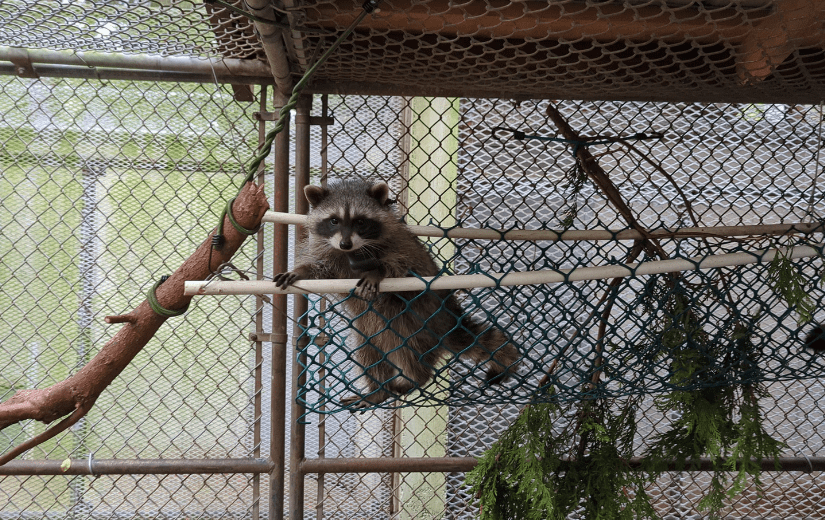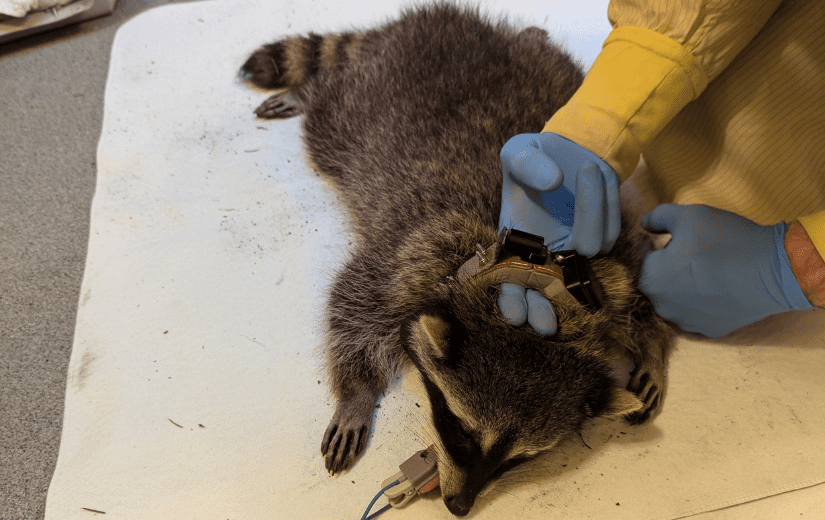The BC SPCA’s Wild ARC in Metchosin is collaborating with a Royal Roads University (RRU) Master’s student on a post-release monitoring study of orphaned raccoons that were in care over the summer. Overseen by wildlife veterinarian, Dr. Adam Hering, the study began in September 2024, with nine of Wild ARC’s juvenile raccoons fitted with GPS/radio collars and released in areas around Greater Victoria.
The collared raccoons are being remotely monitored by GPS satellites and tracked for six months to see their movement patterns, survival rates, and causes of mortality. The collars will fall off automatically after six months, so they do not constrain the growing raccoons. The research is being conducted under a provincial government permit and was approved by the Vancouver Island University Animal Care Committee (on behalf of RRU) and the BC SPCA’s Animal Welfare Research Subcommittee.

“The BC SPCA’s Wild ARC cares for up to 80 orphaned raccoon kits a year. After their rehabilitation, we release the juveniles in fall, similar to when young raccoons would be leaving their mothers in the wild,” explains Wallis Moore Reid, Senior Wildlife Rehabilitator with Wild ARC. “Only three previous studies on rehabilitation-reared and released raccoons have been done in North America over the last three decades. This important research will offer us preliminary data on how Wild ARC’s orphaned raccoons are integrating back into their natural environment and may inform our rehabilitation care practices and protocols to increase the survival potential of released juvenile raccoons in the future.”
Even though raccoons are well adapted to urban areas, juveniles are especially vulnerable as they are learning to survive on their own, exploring new areas for food, water and shelter in our human built environment. Raccoons are generally not aggressive unless they feel threatened, attacked or trapped. So far, monitoring and tracking the raccoons is going well with one raccoon suspected of having removed their collar, another killed by a predator, and a third caught by a pest control company and re-released.

“More than 80% of animals admitted to Wild ARC are due to human causes. It’s so important to recognize we all have a shared responsibility to see the intrinsic value of and coexist with urban wildlife,” says Moore Reid. “Human-wildlife conflicts can be reduced by keeping wild animals healthy and, importantly, by keeping them wild. Raccoons and other wild animals that are attracted to human food sources may become habituated, lose their fear of people, damage property, and draw more animals and other species to the area so we need to help wildlife by making unnatural food and shelter attractants inaccessible. Some easy ways to do this includes securing garbage, compost and recycling until the morning of collection day; harvesting fruit when its ripe and deterring access to vegetable gardens, orchards, farm animals, barbecues, and water features such as ponds; sealing or repairing openings in human structures to prevent animals from entering; keeping pets away from wild animals; and not intentionally or unintentionally feeding wild animals.” Read more about coexisting with wildlife and how to prevent conflicts humanely.
It is important to note, these collared raccoons are wild animals and should not be approached. Members of the public are encouraged to call the BC SPCA Animal Helpline at 1-855-622-7722 or email Wild ARC at info@wildarc.com to report a sighting of a collared raccoon if they appear distressed, injured or sick.
